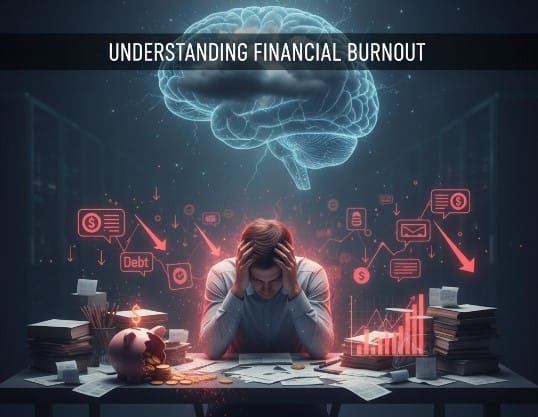What Is Financial Burnout?
We usually hear about burnout in the workplace—but financial burnout is just as real. It’s the emotional and mental exhaustion that comes from constantly worrying about money, budgeting, or chasing financial goals without rest.
If you’ve ever felt like no matter how much you save, budget, or earn, it’s never enough—you may be experiencing financial burnout.
👉 It’s not just about numbers—it’s about how money stress affects your mindset, health, and overall quality of life.
Common Causes of Financial Burnout
- Unrealistic Financial Goals
Setting goals that feel impossible (like saving half your salary when expenses are high) leads to frustration instead of motivation. - Constant Comparison
Scrolling through social media and comparing your lifestyle to others’ curated “success” creates unnecessary pressure. - Debt Overload
High-interest debt creates a feeling of being “trapped,” no matter how hard you work. - Financial Over-Optimization
Spending hours tweaking budgets, tracking every cent, and cutting pleasures until life feels joyless. - Work-to-Earn Cycle
Working endlessly just to cover bills leaves no time for rest or balance.
Signs You May Be Experiencing Financial Burnout
- You dread checking your bank account or credit card balance.
- Budgeting feels like punishment instead of empowerment.
- You obsessively track every expense but feel no progress.
- You’re constantly anxious about the future—even if your finances are stable.
- Money discussions drain your energy or trigger guilt/shame.
👉 If these feel familiar, it’s time to pause and recalibrate.
The Psychology Behind Money Stress
Financial burnout is fueled by scarcity mindset—the belief that there will never be “enough.” Even high earners can feel it because the root problem isn’t always income—it’s mental load and emotional exhaustion tied to money.
For long-term relief, shifting toward an abundance mindset and sustainable money habits is key.
Practical Solutions to Overcome Financial Burnout
1. Redefine “Enough”
Ask yourself: What’s my version of financial security? Setting realistic, personalized goals keeps you motivated instead of overwhelmed.
2. Automate Your Finances
- Set up automatic bill payments.
- Automate savings & investments.
- Use finance apps to track progress passively.
👉 This reduces decision fatigue and frees up mental energy.
3. Build Financial Self-Care
Treat money like part of your wellness routine. Examples:
- Set “no money talk” days.
- Reward yourself for hitting milestones.
- Balance saving with intentional spending on joy.
4. Seek Balance, Not Perfection
A strict budget that drains your happiness isn’t sustainable. Create flexible financial plans that adapt to your lifestyle.
5. Ask for Help
If debt or anxiety feels overwhelming, consider financial advisors, debt counselors, or even therapists specializing in money stress.
Example: From Stress to Stability
Maria, a freelance designer, was constantly worried about unpredictable income. She tracked every cent, skipped outings with friends, and still felt stuck.
Her breakthrough came when she:
- Automated savings (a small % of each client payment).
- Allowed herself a weekly “fun fund.”
- Focused on long-term trends instead of daily fluctuations.
Result? She not only reduced her stress but also felt more in control of her money—without obsessing over every number.
Future-Proofing Your Financial Wellness (2025 & Beyond)
With inflation, economic uncertainty, and the rise of AI-driven work changes, financial stress is likely to stay a global challenge. The best way to future-proof yourself is by:
- Building multiple income streams.
- Using AI-driven finance tools to simplify money management.
- Practicing financial minimalism—focusing on what truly matters.
Conclusion: Financial Health = Mental Health
Financial burnout is more than numbers—it’s about your well-being. By setting realistic goals, automating systems, and practicing financial self-care, you can move from exhaustion to empowerment.
Your money should support your life—not drain it.
🔑 Question for You: Have you ever felt financially burned out, and what’s one small step you could take this week to reduce that stress?
Light CTA:
If this article resonated with you, share it with someone who may be struggling with financial stress. Remember: financial wellness isn’t about perfection—it’s about progress and peace of mind.


